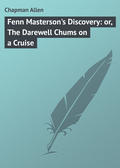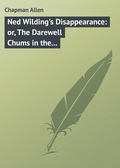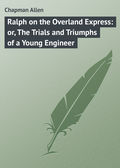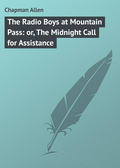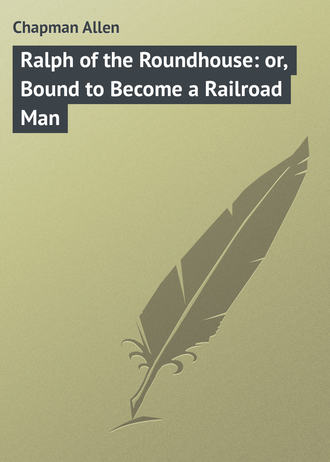
Chapman Allen
Ralph of the Roundhouse: or, Bound to Become a Railroad Man
CHAPTER XXI-A FREE RIDE
The hogshead in which Ralph had ensconced himself was made of loose, defective staves. He found himself facing an aperture, through which he could look quite readily.
Two persons entered the room. One was Ike Slump. The other Ralph recognized as the second-hand dealer, Cohen. The latter carried a lamp, which he placed on a shelf. He closed the door after him, and sat down on a box. Ralph's range of vision was immediately impeded. Ike had lifted himself to the edge of the hogshead and perched there, his feet dangling and beating a tattoo on the staves with his heels.
"Now then, Slump," were Cohen's first words, "you're bound to leave?"
"Haven't I got to?" demanded Ike testily. "I'm in a nice box, I am-lost my job, don't dare to go home, and no money."
"I gave you some."
"A measly ten dollars in a week, not a fiftieth part of what I brought in. See here, Cohen, you haven't given me a fair deal. I've taken all the risk, and what have I got?"
"The risk? the risk?" repeated Cohen. "My young friend, it's me who takes all the risk. Suppose the railroad men should drop in here and find the stuff? Where would I be? As to money, will anybody else you know touch the stuff?"
"Well, I've got to get some funds, I'm going to slope the town for good," announced Ike. "Now, there'll be no slip up if I carry out your plans?"
"Not a bit of it," answered Cohen. "I have no facilities here for handling railroad junk. Jacobs, at Dover, has. I don't dare to ship it by rail. He has his own melters. I furnish the horse and wagon. We'll load you up, and cover the boxes with vegetables. All you've got to do is to drive out of town and deliver the goods at Dover. You say your friend, the tramp, will go with you?"
"Yes, but what about the team? I won't come back, you know. I'm going West for a spell."
"Jacobs will attend to the team. See, here is a letter-give it to him. He'll give you the twenty-five dollars I promised you, and that's the end of it."
"All right. What time shall we start?"
"When the town is asleep, and nobody nosing around. Say one o'clock, sharp."
"I'll be ready."
The conference seemed ended. Ralph comprehended that his double mission would be ineffective unless he got word to Ike Slump's father and the roundhouse foreman within the next four hours.
He lay snug and still, formulating an escape from the place as soon as the two plotters should withdraw.
Ike slipped to the floor, took out a cigarette, lit it, threw the match away, and stretched his arms and yawned.
"Give me a little loose change to play with the crowd, Cohen, will you?" he asked.
Cohen reached in his pocket, but very quickly drew out his hand again empty, to point it excitedly at the hogshead with the sharp cry.
"Fire! look there! You stupid, see what you've done!"
"What have I done? Ginger-the cigarette!"
Ralph quivered as he listened and looked. A swishing sound accompanied a brilliant flare. Ike had carelessly thrown the match with which he had lighted his cigarette into the midst of the dry, tindery excelsior.
"Put it out! Stamp it out!" yelled Cohen.
Ike grabbed a handful or two of the flaming mass, burned his fingers, and retreated, while Cohen made a frightened rush for a stand in one corner of the room holding a big pitcher.
He ran at the hogshead with it. It was half-full of water. Cohen doused it into the hogshead just as Ralph, unable to stand the pressure any longer, arose upright.
Ike gave a stare and a shout. Cohen jumped back with alarm in his face. The water had extinguished the blaze, but the episode had betrayed Ralph's presence to his enemy.
"Who are you?" ejaculated Cohen darkly, grasping, the pitcher and again advancing.
"Needn't ask him-I know!" snapped out Ike. "Grab him, Cohen! It's Ralph Fairbanks, from the roundhouse, and he's a spy!"
Ralph leaned a hand on the hogshead rim to get purchase for a leap out of his difficulties. Ike made a spring for him and grabbed one arm, preventing the movement.
"If he's a railroader and a spy," cried Cohen, "we're in for it!"
"Don't let him go, then-oh!"
Ike went spinning, for Ralph had given him a quick blow, knocking him aside. Cohen swung the pitcher aloft. Down it came with terrific force. Ralph experienced a blow on the side of the head that instantly shut out sense and sight. He fell over the edge of the hogshead, and hung there limp and lifeless.
It was the first blank in his life. Its duration Ralph could only surmise as he opened his eyes. At first he fancied he was blind, for everything was pitchy black about him. He sat up with difficulty, putting a hand to his head where it felt sore and smarted.
Ralph found a bad cut there, which had bled profusely. The blow with the pitcher had been cruelly heavy. He sat up, swaying to and fro, and soon traced out his environment.
He was in a freight car, its doors and windows were closed, and it was rolling along at a good fast rate of speed.
Ralph reasoned out his situation. His enemies had fancied he was seriously hurt, or wanted him out of the way until they could safely remove the stolen plunder. His hopes and plans were effectually balked if he had been long insensible, or was far on the free trip, for which they had booked him. They had carried him from Cohen's rooms by way of the back stairs, had thrown him into the empty car, and had left him to his fate.
Ralph tried the side door of the car. To his satisfaction it shoved open freely. Getting his eyes used to the darkness and his mind clearer, as the moments sped by, he endeavored to guess his location and estimate the time.
He was partly familiar with the road, and knew considerable as to the various passenger and freight trains and their schedule and route. Ralph concluded that he was on the regular nine o'clock freight, which usually hauled empties, going south. Judging from distant lights in houses scattered on the landscape, he estimated that it was about ten o'clock.
He soon surmised from landmarks he passed that the train was not on the main line. As he neared a cattle pen he knew exactly where he was-two miles from Acton and about twenty-two from Stanley Junction.
"They don't stop for ten miles," quickly reckoned Ralph. "There's the creek. I've got to get to Acton and back to the Junction before midnight, if I hope to accomplish anything."
The train slowed somewhat on the up grade. Ralph clung to the door and looked ahead. It was a long train, and he was at about its middle. He had an idea of trying to get to the roof, run back to the caboose, and try and interest the conductor. On second thought, however, he realized that he could not expect them to stop for him. He would only lose time. A daring idea presented itself to his mind, and his breath came quick. An opportunity hovered, and he had too much reliance in himself to let it pass by.
"I've got to get back and stop the removal of that stolen plunder," he kept telling himself over and over, fixing his eyes on the signals that indicated the bridge over the creek.
Ralph posed for a spring as the locomotive struck the bridge and the gleaming waters came nearer and nearer. The bridge had no railing, and they were on the outer side; Ralph posed himself steady and true, let go the door, and leaped into the darkness as the car he was in reached the middle of the bridge.
Then he dropped down like a shot, struck the cold, deep water, and went under.
CHAPTER XXII-BEHIND TIME
The boy was completely at home in the water, but the present instance was somewhat extraordinary. The shock and chill of his daring jump, added to his naturally weakened condition after Cohen's stunning blow with the pitcher, helped to confuse him. But he never lost his presence of mind, and as he felt himself deprived of his usual buoyancy, he struck out under water for the shore.
He waited on the bank long enough for the water to drip off from him, and getting his breath, started to regain the railroad tracks.
When he came to a little station he found it closed for the night, but he knew that the agent must live in some one of the few houses in the settlement. He might locate him and induce him to come to the station and telegraph to Stanley Junction. With the aid of a signal lantern, however, Ralph was able to see the clock in the station. It was a few minutes after ten o'clock.
"There's a train reaches the Junction at eleven twenty-five," he reflected. "By hustling I can catch it at Acton. I can tell more and do more personally in five minutes than I can in five hours by wiring."
Ralph reached Acton some minutes before the West train came in. He had some change in his pocket, paid his fare to the Junction, and went out on the rear platform as they neared the destination.
He left the train a mile from the depot, swinging off at a point that would enable him to reach the roundhouse foreman's house by a short cut.
Ralph found the place closed up. There was a light in one upper room, however, and he had only to knock twice when Forgan came to the door in his shirt-sleeves.
"Is it you, Fairbanks?" he said, in some surprise.
"Yes, sir, and-special!"
"Why, what have you been into?" exclaimed Forgan, catching a glimpse of Ralph's bedraggled form and disfigured head.
"I have been in a freight car for one thing, and in the river for another," said Ralph. "There is no time to lose, Mr. Forgan, if you want to get back those stolen fittings."
"You know where they are?"
"I know where they were at eight o'clock," responded Ralph, "but I know they won't be there much after midnight.
"Good-wait a minute," directed Forgan.
He hurried back into the house and returned drawing on his coat. "I was just going to bed," he explained. "Now, then, Fairbanks," as he led the way to the street. "Tell your story-quick."
Ralph recited his experience of the past four hours, and Forgan hastened his steps as the narration developed the necessity of sharp, urgent action.
"Fairbanks, you are a trump!" commended Forgan, as the story was all told. "I'll leave you here. You get home, into dry clothes, and have your hurt attended to. You had better take the sick-list benefits for a day or two. Good-night-till I have something more definite to say to you."
A dismissal did not suit Ralph at all. It looked like crowding him out of an exciting and interesting game only half-finished.
"I might help you some further," he began, but Forgan interrupted him with the words:
"You've done the real work, Fairbanks, and neither of us will care to muddle in with the details of arrest. I shall put the matter directly in the hands of the road detective, Matthewson. I am sorry for his father's sake if Ike Slump gets caught in the net, but he deserves it fully, and I can't stop to risk the interests of the railway company."
Ralph went home. As he expected, his mother was waiting up for him. She was not the kind of a woman to faint or get hysterical at the sight of a little blood, but she was anxious and trembling as she helped Ralph to get into comfortable trim.
"Don't worry, mother," said Ralph. "This is probably the end of trouble with the Ike Slump complication."
"I always fear an enemy, Ralph," sighed the widow. "It seems as if you are fated to have them at every step. I keep thinking day and night about Gasper Farrington's unmanly threat."
"Mother," said Ralph earnestly, "I am trying to do right, am I not?"
"Oh, Ralph-never a boy better!"
"Thank you, mother, that is sweet praise, and worth going through the experience that will make a man of me. Well, I am going to keep right on doing my duty the best way I know how. I expect ups and downs. Men like Farrington may succeed for a time, but in the end I believe I shall come out just right."
Ralph found himself a trifle sore and stiff the next morning, but he started for work as usual. He was curious as to the outcome of the foreman's action the night previous. Forgan, however, did not show up at the roundhouse till ten o'clock. He at once called Ralph into his little office.
"Well, Fairbanks," he said briskly, "I suppose you will be interested to know the outcome of last night's affair?"
"Very much so," acknowledged Ralph.
"The road detective and myself were at Cohen's before midnight. The birds had flown."
"Had they moved the plunder, too?"
"Yes, what you described as being in boxes was all carted away."
"And Ike Slump had gone?"
"Presumably. We found that two horses and a wagon belonging to Cohen were missing. The only person we found, outside of Cohen, was a little fellow asleep in an outside shed."
"Was his name Teddy?" And Ralph gave a rapid description of the county farm waif.
"That's the boy. He's in jail with Cohen, now. They want to detain him as a witness. In Cohen's barn, hidden under some hay, we found two old locomotive whistles. He claims that he did not know they were there. The road detective, however, says if we can fasten the least real suspicion on Cohen and break up his fence, we will have rooted out this robbery evil, for the crowd he housed and encouraged to steal has scattered."
"Has Mr. Matthewson tried to overtake the wagon?"
"Yes, he has men out in pursuit. If we can recover those fittings, Fairbanks, it will be a glad day for me and a lucky one for you."
But with the arrest of Cohen, his release on bail, bound over to appear before the September grand jury, the affair seemed ended.
The little fellow, Teddy, could not, or would not tell, much and was also released. Ike Slump's crowd melted away, and Ike Slump, and his tramp friend, and Cohen's two horses and wagon, and the boxed-up brass fittings, had vanished as completely as if the earth had opened and swallowed them up.
CHAPTER XXIII-BARDON, THE INSPECTOR
Matters dropped into a pleasant routine for Ralph, the two weeks succeeding his rather stormy introduction into active railroad life at the roundhouse of the Great Northern at Stanley Junction.
It was like a lull after the tempest. The youthful hoodlum gang that had been a menace to Ralph and the railroad company had been entirely broken up.
Tim Forgan was a changed man. He and the senior Slump had drifted apart, and the foreman's previous irascibility and suspicious gloom had departed. He was more brisk, natural and cheery, and Ralph believed and fervently hoped had given up the tippling habit which had at times made him a capricious slave to men and moods.
The lame helper had become a useful, pleasant chum to Ralph. There was not a day that he did not teach the novice some new and practical point in railroad experience.
Gasper Farrington Ralph had not met again.
At the cottage Van led an even, happy existence, making no trouble, being extremely useful and industrious, and daily more and more endearing himself to both Ralph and Mrs. Fairbanks.
With the dog house crowd Ralph had become a general favorite. He had won the regard of those rough and ready fellows, and his loyal adhesion to Griscom in the fire at the shops, his rescue of little Nora Forgan, and his manly, accommodating ways generally, had enforced their respect, and more than one dropped his oaths and coarseness when Ralph approached, and they tipped over the liquor bottle of one of the "extras" who had the temerity to ask Ralph to test its contents.
Altogether, Ralph was going through a happy experience, and every day life and railroading seemed to develop some new charm of novelty and progress.
It was with a proud spirit that he took home his first month's salary, twenty-seven dollars and some odd cents.
Those odd cents, with some added, Ralph stopped near the depot to hand over to little Teddy.
The county farm orphan had been turned loose from custody after a week's imprisonment, with orders to report to the police at nine o'clock every Monday morning.
He was practically on parole, the authorities hoping that on the trial of Cohen he might give some evidence that would implicate the stolen-goods receiver, and Ralph had run across the little fellow drifting aimlessly about the town.
Ralph had a long talk with him, then he decided to "stake" him as a newsboy. The depot watchman agreed to let him sell papers at the train exit, and Teddy had done fairly well, earning enough to pay for his lodging, Ralph making up the deficiency as to meals.
It was a bright hour in Mrs. Fairbanks' life when, after putting together what money she had with Ralph's earnings, and deducting the interest due Gasper Farrington, they were able to count a surplus of nearly twelve dollars.
Mrs. Fairbanks took the interest money to a bank where she had been notified the note was deposited, paid the amount, received the note, and with a lightened heart contemplated the future.
Two mornings later, when Ralph entered the roundhouse, he was accosted by Limpy in a keen, quick way.
"Primping day, Fairbanks," said the lame helper. "You want to hustle."
"What are you getting at?" inquired Ralph.
"Inspection."
"That's new to me."
"So I'll explain. The inspector is on his tour, we got the tip to-day. Came up on the daylight mail."
"What does he inspect?"
"Everything from a loose drop of oil to a boiler dent. He is so beloved that the dog house crowd kick loose all the litter cans soon as he's gone, and so particular that he inspects the locomotives with a magnifying glass."
"Who is he?" inquired Ralph curiously.
"Bardon is his name-it ought to be Badone! He's a relative of and trains with the division superintendent. He acted as a spy at the switchmen's strike, got nearly killed for his sneaking tactics, and the company rewarded him by giving him a gentlemanly position."
Ralph readily saw that this Mr. Bardon was not a favorite with the rank and file of the railroad crowd.
"Well, we'll have to show him what a lot of active elbow grease will do towards making this a model roundhouse," said Ralph cheerfully.
Limpy was not at all in harmony with this idea, and showed it plainly by action and words. He and the others considered the roundhouse and its privileges essentially their personal property, and resented advice or censure, especially from a man whom they intensely disliked.
During the afternoon various little things were done about the dog house that indicated the spirit of the crowd there. A pasteboard box nailed to the wall bore written directions to engineers and firemen to keep their kid gloves there. Another stated that brakemen must not wear turned collars. Various receptacles were labeled "For cinders," "Clean your nails here," and the general layout was a palpable satire on the strained relations with an expected visitor who was considered a martinet.
Ralph went carefully and conscientiously to work to brighten up things a bit and make them look their best, while Limpy growled and grumbled at him all the afternoon.
About four o'clock the lame helper was enjoying a brief respite from work at his usual lounging place, standing on a bench and looking out of a window. He called Ralph so suddenly and sharply that the latter hurried towards him.
"Quick!" uttered Limpy, face and hands working spasmodically, as they always did when he was excited.
"What's up?" inquired Ralph, leaping to the bench beside him.
"Look there!" directed the helper.
He pointed to a long freight train backing down the tracks. It had just passed a switch.
"Pivot loose, and the signal flanges exactly reversed!" pronounced Limpy quickly. "They think they are on track A. Say, it's sure to be a smash!"
In a twinkling Ralph's eye took in the situation. The train was on a curve, and had run back all right in response to switch A, set open, according to the white indicator on top. But red should have shown, it appeared. The pivot holding the signal in unison with the operating bar must have become loosened, and the wind had blown the signal plate awry.
The freight, therefore, had struck track B, which a hundred feet further on split off onto two sets of rails. Both had short ends, terminating at bumpers, and each held a single car.
Track C held a gaudy, expensive car belonging to some traveling show, all gold and glitter, and must have cost eighteen thousand dollars. Track D held an old disabled box car. And into one or the other of these the backing freight was destined to run unless checked inside of the next half minute.
"Give me a show!" spoke Ralph, in a hurry.
He brushed Limpy aside, leaped through the window, struck the ground eight feet below the high sill, and made a run towards the backing freight.
The curve prevented his seeing the engine or any one to whom he might signal. He doubled his pace, reached the split switch, unlocked the bar, half-lifted it, and stood undecided.
It was not his province to interfere, he well knew, if half the cars on the road were reduced to kindling wood through the mistake or carelessness of some one else, but action was irresistible with his impetuous nature when the same meant timely service.
If he left the switch as it now was, the freight would back down into the show car with terrific destructive force.
It seemed a pity to spoil that new pretty model of the car builder's art. Ralph discerned that the box car was ready for the scrap heap, and decided.
He pulled the switch over, not a moment too soon, jumped back, and the next minute the freight train struck the solitary box car, and it collapsed like a folding accordion.



